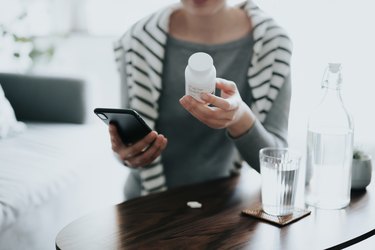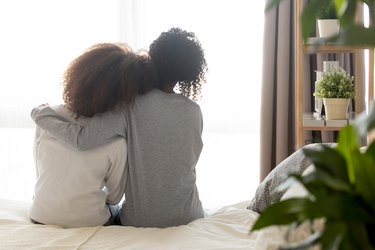
Gamma-aminobutyric acid, more commonly known as GABA, is an amino acid and inhibitory neurotransmitter. Translation: It blocks signals in your central nervous system and slows down your brain, leading to calming side effects, according to the Cleveland Clinic.
GABA is a natural chemical in your brain, but it also comes in over-the-counter supplement form and can be found in certain foods. Its ability to slow brain function has lead to beliefs that it can help with levels of anxiety and panic attacks, but there is very limited evidence on the effectiveness of GABA supplements.
Video of the Day
Video of the Day
Can GABA Supplements Really Help With Anxiety?
GABA supplements can potentially help with anxiety symptoms, like a racing heart, because of the amino acid's natural calming effects, but there isn't enough research to make concrete conclusions, says Reshma Trainson, PharmD, a Philadelphia-based pharmacist.
"There are many mixed reviews and conclusions from the minimal studies out there," Trainson says. "As a pharmacist, we're often really wary of supplements because of the lack of research there is."
Reliable studies on GABA supplements improving anxiety are extremely limited, although there are some small studies on related topics.
One April 2018 study in the Journal of Clinical Neurology examined how doses of GABA may treat insomnia. The study was a month long and included only 40 people, each of whom took 300 milligrams of GABA before bed. By the end of the study, researchers found participants' sleep quality had improved, but more research is needed to draw any firm conclusions.
In a September 2009 study in the International Journal of Food Sciences and Nutrition, researchers took a look at how GABA supplements helped reduce stress. A small group of people ate chocolate that was dosed with 28 milligrams of GABA, then were given a math problem. Their heart rate variability and saliva were collected and sampled.
The study results concluded that the GABA-laced chocolate had a stress-reducing effect. But again, larger and more current studies need to be done here before we can say for sure what GABA's true effects are.
GABA Dosage
With only small studies and narrow research available, a maximum daily dose of GABA for severe anxiety is difficult if not impossible to determine.
GABA dietary supplements also aren't regulated the same way prescriptions are by the Food and Drug Administration (FDA), which can make their safety and effectiveness questionable, Trainson says.
"From a clinical point of view, I personally advocate for seeking a doctor over supplements," Trainson says. "There isn't enough reliable information to know if GABA supplements are safe."
GABA supplements are widely available, but as the Cleveland Clinic explains, there isn't enough scientifically backed evidence to support using them for treating medical conditions. There's a lot we still don't know, including how long a GABA supplement stays in your system.
Possible Side Effects of GABA
Another risk of taking an unregulated supplement like GABA are the unknown possible side effects. Per the Cleveland Clinic, GABA is thought to help with other health conditions, including high blood pressure, diabetes and insomnia, but the evidence really isn't clear.
An August 2021 study in Nutrients examined the safety of GABA and concluded there could be these potential side effects:
- Burning sensation in throat
- Tingling skin
- Shortness of breath
The study also includes a recommendation to consult a doctor if you're using a GABA product that has 300 milligrams or more and used for longer than a month. The side effects of taking too much GABA are not well-documented, making it a potential risk to your health.
Precautions
There's always a risk when taking any kind of supplement or substance. With limited information on GABA's effects, Trainson warns it's likely not the best option to treat anxiety and panic attacks.
"I'm not sure I fully support the use of GABA because of the lack of research and because of the significant drug interactions there are," she says.
If any of the following apply to you, you probably shouldn't take GABA supplements unless cleared by a doctor:
- Allergic to GABA supplement ingredients
- Pregnant or breastfeeding
- Living with chronic conditions
- Taking other medications, including those for blood pressure or diabetes
Trainson highly encourages people to consult a doctor before trying out any over-the-counter GABA supplement to treat their anxiety. There could be safer, more well-researched treatment options available to you.
Foods With GABA
GABA is a natural substance, so there are foods high in GABA that you can eat if you're looking to increase your levels.
Per the Cleveland Clinic, these natural food sources contain GABA:
- Brown rice
- Fermented foods (kimchi, miso, tempeh)
- Soybeans
- Mushrooms
- Broccoli
- Cabbage
- Cauliflower
- Brussels sprouts
- Sweet potato
- Spinach
- Sprouted grains
- Tomatoes
When to See a Doctor
Without strong evidence of safety and efficacy for GABA supplements, it's better to see a doctor before taking them and to discuss other anxiety treatment options, Trainson says.
If you're having anxiety symptoms or panic attacks, talk to your doctor about possible medications or solutions they can recommend before taking an over-the-counter dietary supplement like GABA.
- Nutrients: "United States Pharmacopeia (USP) Safety Review of Gamma-Aminobutyric Acid (GABA)"
- International Journal of Food Sciences and Nutrition: "Psychological Stress-Reducing Effect of Chocolate Enriched with γ-aminobutyric acid (GABA) in Humans"
- Journal of Clinical Neurology: "Safety and Efficacy of Gamma-Aminobutyric Acid from Fermented Rice Germ in Patients with Insomnia Symptoms: A Randomized, Double-Blind Trial"
- Cleveland Clinic: "Gamma-Aminobutyric Acid (GABA)"


